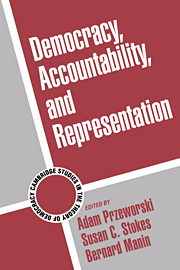Book contents
- Frontmatter
- Contents
- List of Contributors
- Introduction
- Part One Elections, Accountability, and Representation
- 1 Elections and Representation
- 2 Electoral Accountability and the Control of Politicians: Selecting Good Types versus Sanctioning Poor Performance
- 3 What Do Policy Switches Tell Us about Democracy?
- 4 Accountability and Authority: Toward a Theory of Political Accountability
- 5 Accountability and Manipulation
- 6 Party Government and Responsiveness
- 7 Democracy, Elections, and Accountability for Economic Outcomes
- Part Two The Structure of Government and Accountability
- Part Three Overview
- Author Index
- Subject Index
1 - Elections and Representation
Published online by Cambridge University Press: 05 June 2012
- Frontmatter
- Contents
- List of Contributors
- Introduction
- Part One Elections, Accountability, and Representation
- 1 Elections and Representation
- 2 Electoral Accountability and the Control of Politicians: Selecting Good Types versus Sanctioning Poor Performance
- 3 What Do Policy Switches Tell Us about Democracy?
- 4 Accountability and Authority: Toward a Theory of Political Accountability
- 5 Accountability and Manipulation
- 6 Party Government and Responsiveness
- 7 Democracy, Elections, and Accountability for Economic Outcomes
- Part Two The Structure of Government and Accountability
- Part Three Overview
- Author Index
- Subject Index
Summary
The claim connecting democracy and representation is that under democracy governments are representative because they are elected: if elections are freely contested, if participation is widespread, and if citizens enjoy political liberties, then governments will act in the best interest of the people. In one – the “mandate” – view, elections serve to select good policies or policybearing politicians. Parties or candidates make policy proposals during campaigns and explain how these policies would affect citizens' welfare; citizens decide which of these proposals they want implemented and which politicians to charge with their implementation, and governments do implement them. Thus, elections emulate a direct assembly and the winning platform becomes the “mandate” that the government pursues. In a second – “accountability” – view, elections serve to hold governments responsible for the results of their past actions. Because they anticipate the judgment of voters, governments are induced to choose policies that in their judgment will be positively evaluated by citizens at the time of the next election.
Yet both views are problematic. Representation is an issue because politicians have goals, interests, and values of their own, and they know things and undertake actions that citizens cannot observe or can monitor only at a cost. Even if once they are in office politicians may want to do nothing but serve the public, to should be doing or to judge retrospectively if they did what they should have done.
- Type
- Chapter
- Information
- Democracy, Accountability, and Representation , pp. 29 - 54Publisher: Cambridge University PressPrint publication year: 1999
- 200
- Cited by

